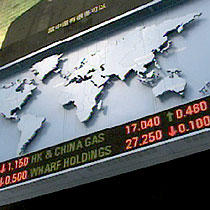-
(单词翻译:双击或拖选)
Hong Kong
03 July 2007
Ten years ago, an unprecedented1 financial crisis swept through East Asia requiring the biggest country bailouts in history. VOA's Heda Bayron in Hong Kong looks back at the turbulence3 that began in July of 1997 and how Asia emerged from the crisis.
 |
| Raden Pardede |
Raden Pardede remembers those days. He is the deputy president director of the Indonesian government agency responsible for selling the assets of those bankrupt companies. "That's basically one of the biggest crises in our lifetime, because after that, I think in 1998, our economy really significantly collapsed4, which in terms of GDP growth we had a 13.5 percent negative growth. So the world collapsed. After that, of course, most of the conglomerates5 collapsed, right? That's why we had significant unemployment soon after 1998. The middle and lower income groups really suffered."
 |
But the bubble burst, first in Thailand, where companies had overloaded6 on foreign debt. Worried investors7 began selling the Thai baht and it rapidly lost value against the dollar.
Panic spread. The Indonesian rupiah, the South Korean won, the Malaysian ringgit and other currencies sank. Stock markets plunged8 and interest rates soared.
Governments used up foreign exchange reserves to stop the currency depreciation9, lent money to cash-strapped companies and bought shares in stock markets. But the crisis continued and millions were jobless.
Indonesia and South Korea asked the International Monetary10 Fund to bail2 them out.
 |
| Park Yung-chul |
Today, not only has Asia recovered from the crisis, it has learned the lessons of 1997.
"We have reconstructed much of the South Korean economy and the exchange rate is being properly valuated rather than undervalued and we possess a lot of foreign exchange reserve, which makes it less possible for foreign speculators to confuse the market," says Yung-Chul
Raden Pardede says, if another crisis comes, Indonesia is in a much stronger position than in 1997. "We may see some crisis coming. We don't know exactly when, any trigger from one country to another country, contagion12 is of course inevitable13 in this globalization era. But I think the magnitude will not be the same as what we have in 1997."
Asian governments continue to take measures to strengthen their economies and, they hope, to prevent another crisis.
 收听单词发音
收听单词发音
1
unprecedented

|
|
| adj.无前例的,新奇的 | |
参考例句: |
|
|
|
2
bail

|
|
| v.舀(水),保释;n.保证金,保释,保释人 | |
参考例句: |
|
|
|
3
turbulence

|
|
| n.喧嚣,狂暴,骚乱,湍流 | |
参考例句: |
|
|
|
4
collapsed

|
|
| adj.倒塌的 | |
参考例句: |
|
|
|
5
conglomerates

|
|
| n.(多种经营的)联合大企业( conglomerate的名词复数 );砾岩;合成物;组合物 | |
参考例句: |
|
|
|
6
overloaded

|
|
| a.超载的,超负荷的 | |
参考例句: |
|
|
|
7
investors

|
|
| n.投资者,出资者( investor的名词复数 ) | |
参考例句: |
|
|
|
8
plunged

|
|
| v.颠簸( plunge的过去式和过去分词 );暴跌;骤降;突降 | |
参考例句: |
|
|
|
9
depreciation

|
|
| n.价值低落,贬值,蔑视,贬低 | |
参考例句: |
|
|
|
10
monetary

|
|
| adj.货币的,钱的;通货的;金融的;财政的 | |
参考例句: |
|
|
|
11
economist

|
|
| n.经济学家,经济专家,节俭的人 | |
参考例句: |
|
|
|
12
contagion

|
|
| n.(通过接触的疾病)传染;蔓延 | |
参考例句: |
|
|
|
13
inevitable

|
|
| adj.不可避免的,必然发生的 | |
参考例句: |
|
|
|















